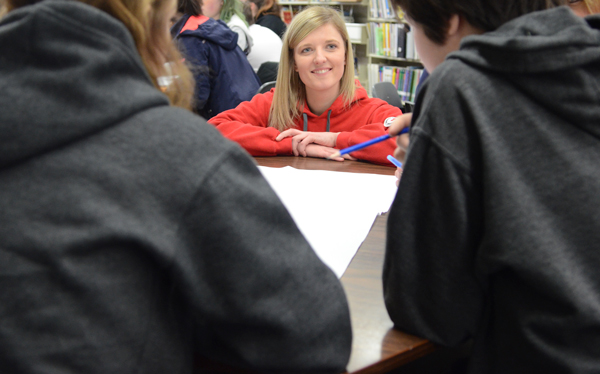
A handful of Prince Albert schools are hoping to go beyond Pink Shirt Day by giving a group of student leaders the tools they need to promote healthy relationships and end bullying amongst their peers.
Forty students from seven Saskatchewan Rivers schools ranging from Grade 7 to Grade 10 took part in a two-day bullying prevention symposium at Red Wing School which wraps up today. The training is based on the Beyond the Hurt bullying prevention program from the Canadian Red Cross and is being delivered by a pair of adult facilitators, including former Saskatchewan Roughrider Spencer Moore, a member of the Montreal Alouettes.
“The neat thing about what we do with these workshops is we’re looking to find leaders in the schools who show an interest in furthering their development and diving into our … program,” Moore said.
“Then they can take this information back to their schools and lead the kids they are around every day.”
Over the two days, the students learned about healthy relationships and healthy schools, communication and conflict resolution, human rights and diversity, power dynamics, bullying and cyberbullying, harassment and discrimination, sexual harassment, impact and intervention and promoting healthy peer relationships. The students have been given workbooks and USB sticks with all the resources they will see over the two days so that they can pass those lessons on to their peers. Each group of students had an adult with them from their school who will assist them when they return from the symposium.
In the first hour and a half of the two-day symposium Thursday, the students had already brainstormed ways they could see, hear or feel healthy relationships, and they had begun to map out safe and unsafe spaces that exist within their own schools.
The maps they created will be added to by their peers before being presented to the teachers at their schools to show where more work needs to be done.
The students were selected by their schools as good candidates to pass along the information learned and to become leaders in their own school communities.
“We were looking for a mix of different students from our older grades who we felt would be well-positioned to do some positive things in this school,” said Graham McGregor, the principal at Red Wing School.
‘We hope that they take the basis for some leadership skills and opportunities back into our classrooms and into our schools … so that we can carry the positive messages forward that they receive today.”
According to Moore, targeting the Grade 7-10 age range is meant to prevent bullying from happening as opposed to intervening once it has already started.
“We try to get the kids ahead of the curve,” he said.
‘This is stuff I wish had been taught to me at that age.”
While Moore has spoken in front of schools at rallies and events on many occasions, this is just the second time he has led one of these workshops. Still, he’s already seen the impact it can have on students who attend.
“It was awesome to be able to interact with the kids on a longer basis,” he said.
“By the end of those two days, you have a good feel for which kids … are the leaders and who needs some help. I love doing the presentations and I loved that role I had for a couple of years, but when you get to sit down and get to know the kids on a one-on-one basis and get them to participate and work in groups … it’s more curriculum and school-based and less of a show. This is a little more effective.”
A pair of Grade 7 students attending the symposium from John Diefenbaker Public School seemed eager to take the lessons back and make their school a better place.
“I think it’s really important because everyone can raise awareness so everyone knows what’s happening, said Alea Hordal. “I hope we can share it with everyone else in our school, and go to the younger grades.”
Hordal said she didn’t see much bullying, but she’s sure it happens.
She said the symposium is important so students “can stand up against (bullying) and help other people who are going through it. The teachers aren’t always there to see it.”
A fellow Diefenbaker School student, Ethan Bil, said he’s always learning, and by 10:30 a.m., had begun to learn how to build healthy friendships.
“It teaches us how to be a good person,” he said.
He said the lessons learned this week should help him help others, “so the next generation doesn’t have to feel lonely.”
He said he’s seen times people get too wild and can say mean things to each other.
“For me, I like to be the positive one to make sure everyone is in line and balanced so no one every hurts each other.”
Those types of attitudes are what school administrators like McGregor are hoping to see. He said he wanted to host the event after hearing of something similar held in Big River last year.
“Anytime we have an opportunity to offer something like this, a positive to the school community we want to support (it) the best we can,” he said. McGregor believes that for other students, hearing these messages from their peers and not just from their teachers and administrators will provide extra impact.
“We think it will be a powerful message,” he said. “To receive it from their peers can mean far more … for them.”

